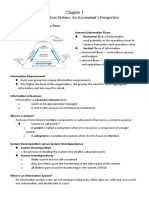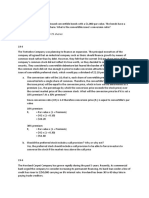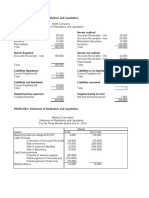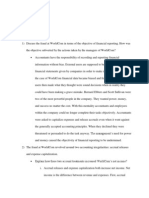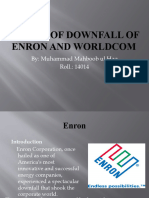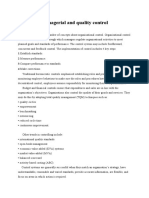Assignment Enron & Worldcom - Final
Uploaded by
MD FAISALAssignment Enron & Worldcom - Final
Uploaded by
MD FAISALAN ASSIGNMENT ON
ACCOUNTING SCANDAL OF ENRON &
WORLDCOM
NAME OF THE COURSE: FINANCIAL
ANALYSIS FOR MANAGERS
COURSE CODE: EMBA 561
SUBMITTED TO
Dr. Sujit Saha
Course Teacher
Course Code: EMBA 561
East West University
SUBMITTED BY
Bellal Hossain
Student ID: 2015-1-91-005
Session: Fall - 2015
EMBA Program
East West University
Date of Submission: 18 September 2015
Accounting Scandal of Enron & WorldCom
INTRODUCTION
Corporate scandals in the corporate world, whether caused by corruption, bribery, unethical
practice, fraudulent reporting or other greed tend to have a significant impact on the economy
as a whole. Many of the biggest corporate accounting scandals in history happened during the
last decade and a half. The scandals of Enron and WorldCom were two of the widely
discussed accounting scandals which caused by poor corporate governance, fraudulent
reporting, a dishonest culture that resulted serious conflicts of interests and unethical practice.
Here, the effects and person behind the scandals, the fraud process, and the process of
identification of the fraud and culprits, punishment to them for the scandals are summarized
below.
ENRON SCANDAL (2001)
Company: Houston-based commodities, energy and Service Corporation.
What happened: The Company used accounting techniques involving
unconsolidated partnerships and “special purpose entities” to prevent significant
losses from appearing on its financial statements and to conceal the extent of its
indebtedness. When these dubious accounting tactics came to light, nearly all the
profits reported since 2000 disappeared and Enron quickly collapsed.
Why happened: The more fundamental causes appear to have been matters of
organizational design—in particular, bonus plans that paid managers to increase
reported earnings. In desperate attempts to keep up with aggressive earnings targets,
Enron's managers became so indiscriminate in committing the firm's capital that, in
1999, the international energy division presented Skilling with a plan that
contemplated earning just $100 million in profit on a capital base of $7 billion. With
that kind of performance—which amounts to a loss of several hundred million in
terms of economic profits—the CFO faced considerable pressure to use deceptive
tactics to put off the day of reckoning.
Main players: CEO Jeff Skilling and former CEO Ken Lay.
How they got caught: Turned in by internal whistleblower Sherron Watkins; high
stock prices fuelled external suspicions.
Penalties: Lay died before serving time; Skilling got 24 years in prison. The company
filed for bankruptcy. Arthur Andersen was found guilty of fudging Enron's accounts.
Fun fact: Fortune Magazine named Enron "America's Most Innovative Company" 6
years in a row prior to the scandal.
Accounting Scandal of Enron & WorldCom
WORLDCOM SCANDAL (2002)
Company: Telecommunications Company; now MCI, Inc.
What happened: The Company had classified payments for line costs as capital
expenditures rather than current expenses. Line costs were operating expenses but
WorldCom classified as capital expenditure. Recorded account entries without any
evidence. Reserve accounts were manipulated to increase figures.
Why happened: Lacking Corporate Governance was Root cause of WorldCom’s Failure. The
company’s board of directors was not paying attention to how the company was running. Board of
directors had a “habit of rubber stamping senior management decisions without scrutinizing”
WorldCom raced to make more than 70 acquisitions in two decades. Acquisitions were
never consolidated into a single, seamless enterprise.
Main player: CEO Bernie Ebbers.
How he got caught: WorldCom's internal auditing department uncovered $3.8 billion
of fraud.
Penalties: CFO was fired, controller resigned, and the company filed for bankruptcy.
Ebbers sentenced to 25 years for fraud, conspiracy and filing false documents with
regulators.
Fun fact: Within weeks of the scandal, Congress passed the Sarbanes-Oxley Act,
introducing the most sweeping set of new business regulations since 1930s.
Conclusion
Corporate scandals have a great impact in the whole economy of the world. So all the
companies should create an environment and ensure various aspects of corporate governance
to avoid such scandals. In this way the company will define the role of the Corporation'
board, especially its top executives; ensure the Corporation's corporate culture and whistle-
blowing system; and implement the recommendations of the Corporation's internal auditor
and external auditors.
Accounting Scandal of Enron & WorldCom
You might also like
- The Following Questions Might Be Addressed When An Auditor Is Completing An Internal Control QuestionNo ratings yetThe Following Questions Might Be Addressed When An Auditor Is Completing An Internal Control Question1 page
- Bank Valuation and Value Based Management: Deposit and Loan Pricing, Performance Evaluation, and Risk, 2nd EditionFrom EverandBank Valuation and Value Based Management: Deposit and Loan Pricing, Performance Evaluation, and Risk, 2nd Edition1/5 (1)
- Air Conditioning: Tip: Blower Motor Fig 1: Compressor Circuit0% (1)Air Conditioning: Tip: Blower Motor Fig 1: Compressor Circuit2 pages
- The Rise and Fall of Worldcom: The World'S Largest Accounting FraudNo ratings yetThe Rise and Fall of Worldcom: The World'S Largest Accounting Fraud14 pages
- Week 7: What Is The Magnitude of Audit Risk If Inherent Risk Is .50, Control Risk Is .40 and Detection Risk Is .10?No ratings yetWeek 7: What Is The Magnitude of Audit Risk If Inherent Risk Is .50, Control Risk Is .40 and Detection Risk Is .10?3 pages
- Basic Audit Sampling Concepts: Review QuestionsNo ratings yetBasic Audit Sampling Concepts: Review Questions4 pages
- Home Office and Branch Accounting ProblemsNo ratings yetHome Office and Branch Accounting Problems3 pages
- Planning An Audit of Financial Statements8888888No ratings yetPlanning An Audit of Financial Statements888888811 pages
- Chapter 1 - The Information System An Accountant's PerspectiveNo ratings yetChapter 1 - The Information System An Accountant's Perspective12 pages
- Lecture 4 LEGAL AND ETHICAL ISSUES FOR IT AUDITORS HANDOUTS PDFNo ratings yetLecture 4 LEGAL AND ETHICAL ISSUES FOR IT AUDITORS HANDOUTS PDF11 pages
- Chapter 14 Multiple Choice, Government and Non For Profit100% (1)Chapter 14 Multiple Choice, Government and Non For Profit9 pages
- Chapter 8: Quality Control: Questions 3 To 5No ratings yetChapter 8: Quality Control: Questions 3 To 512 pages
- Accounting Fraud at Worldcom: Integrated Case StudiesNo ratings yetAccounting Fraud at Worldcom: Integrated Case Studies11 pages
- Errors and Irregularities in The Transaction CycleNo ratings yetErrors and Irregularities in The Transaction Cycle22 pages
- FORM 20A.7 Sample Audit Program For Branch Bank Operations AuditNo ratings yetFORM 20A.7 Sample Audit Program For Branch Bank Operations Audit6 pages
- This Study Resource Was: Chapter 4: Developing A Competitive Strategy Contemporary Cost Management TechniquesNo ratings yetThis Study Resource Was: Chapter 4: Developing A Competitive Strategy Contemporary Cost Management Techniques1 page
- This Study Resource Was: Consignment SalesNo ratings yetThis Study Resource Was: Consignment Sales3 pages
- Expected Learning Outcomes: After Studying This Chapter, You Should Be Able ToNo ratings yetExpected Learning Outcomes: After Studying This Chapter, You Should Be Able To21 pages
- Chapter: Six How Financial Statements Are Used in ValuationNo ratings yetChapter: Six How Financial Statements Are Used in Valuation8 pages
- Get Auditing: A Risk Based-Approach 11th Edition Johnstone-Zehms Free All Chapters100% (2)Get Auditing: A Risk Based-Approach 11th Edition Johnstone-Zehms Free All Chapters79 pages
- Documentary On Worldcom Corporate Scandal 2No ratings yetDocumentary On Worldcom Corporate Scandal 26 pages
- TVM Analysis: 4-41 (A) Draw Cash Flow Time Lines Line Is A Graphical Reprentation That Is Used To Show TheNo ratings yetTVM Analysis: 4-41 (A) Draw Cash Flow Time Lines Line Is A Graphical Reprentation That Is Used To Show The8 pages
- Difficult Transitions: Case Study Chapter 1 An Overview of Organizational BehaviorNo ratings yetDifficult Transitions: Case Study Chapter 1 An Overview of Organizational Behavior2 pages
- Requirement-B: Du Pont Equator of Campsey Computer Company and The IndustryNo ratings yetRequirement-B: Du Pont Equator of Campsey Computer Company and The Industry1 page
- Leading in Organisations: Chapter SummaryNo ratings yetLeading in Organisations: Chapter Summary24 pages
- Managerial and Quality Control: Chapter SummaryNo ratings yetManagerial and Quality Control: Chapter Summary14 pages
- Comparative Analysis ON Marketing Strategy of Robi Telecom: Course: Business Communication Summer - 2016No ratings yetComparative Analysis ON Marketing Strategy of Robi Telecom: Course: Business Communication Summer - 201626 pages
- 55461-Article Text-117464-1-10-20230724No ratings yet55461-Article Text-117464-1-10-2023072412 pages
- Experiment 1.3: R-L Circuit Analysis and Power Factor DeterminationNo ratings yetExperiment 1.3: R-L Circuit Analysis and Power Factor Determination5 pages
- Gyan Capsule 1 - Introduction To ConsultingNo ratings yetGyan Capsule 1 - Introduction To Consulting7 pages
- MATG the Marketers Guide to Google Gemini and NotebookLMNo ratings yetMATG the Marketers Guide to Google Gemini and NotebookLM26 pages
- STC-1000 Temperature Controller Operating Manual: or or orNo ratings yetSTC-1000 Temperature Controller Operating Manual: or or or1 page
- DOP-112MX DOP-112WX DOP-115MX DOP-115WX: Instruction Sheet0% (1)DOP-112MX DOP-112WX DOP-115MX DOP-115WX: Instruction Sheet8 pages

























